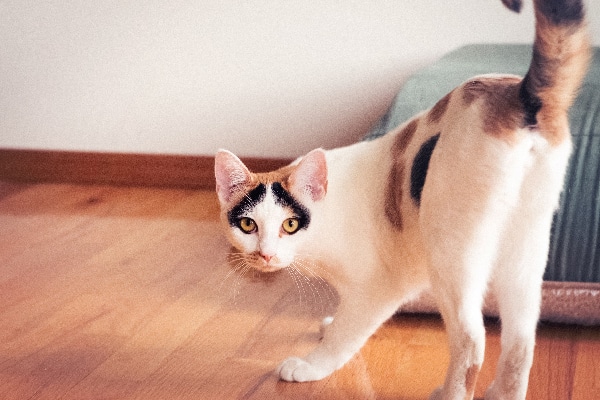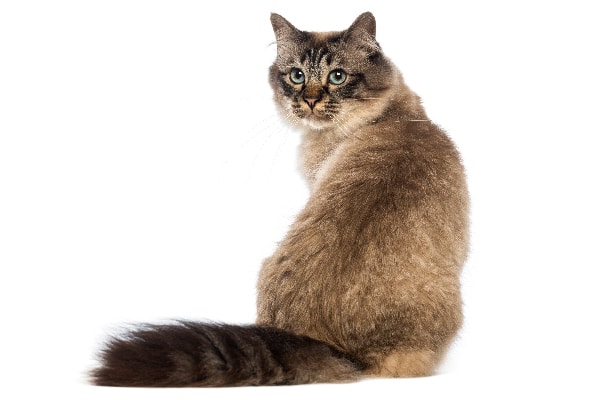Later, I found out that Jax was not a copycat. Unfortunately, he had a tail infection. So, is it a problem when you see a cat chasing its tail? What do you do when a cat is chasing its tail? Well, let's find out.

source:freepik
First of all, is it normal to see a cat chasing its tail?
Some cats, like dogs, chase their tail just for fun. "Some cats chase their tails just for fun, but this is less common in cats than in dogs," says Dr. Sasha Gibbons of the Just Cats Veterinary Hospital in Stamford, Connecticut.
But sometimes a cat chasing its tail means a little more in the language of the cat tail. And, unfortunately, there are times when a cat chasing its tail signals the opposite of fun.
"Cats may also chase their tail for a number of medical reasons," explains Dr. Gibbons. "Cats chase their tail if they have an infection and if the tail is uncomfortable, or if it itches due to allergies. Cats can also suffer from a condition called hyperesthesia syndrome, which is caused by hyperactivity of nerve endings, and cats feel a tingling sensation on their tails.
Another problem that could be at play and that requires the attention of the veterinarian is the stallion's tail, which is a condition of the cat's skin.
It is important to know the normal language of your cat's body and tail to ensure that your cat is not behaving abnormally for a medical reason.
What happens if a cat runs after its tail and bites it at the same time?
Make sure you have a plan of action if you notice a cat running after its tail and biting it! "Cat tails can become infected very easily and it can be difficult to resolve a tail infection. Any injury to the tail (self-inflicted) or from another cat should therefore be evaluated by a veterinarian," explains Dr. Gibbons.

Source:freepik
How to prevent a cat from chasing its tail?
If your cat is chasing its tail and you suspect an infection, hyperesthesia, stud tail or any other injury, take your cat to the veterinarian as soon as possible.
But, should you ever worry about a cat chasing its tail in a playful manner?
"If a cat is simply chasing its tail, without biting or damaging it, it may be out of boredom," explains Dr. Gibbons. "If an owner sees his cat doing this, he may try to redirect the cat to chase a toy on a rope or a laser pointer".
If you are concerned that your cat may be bored because you are away from home for long periods of time, Dr. Gibbons suggests using interactive toys such as Frolicat or Panic Mouse. This will help your cat focus more on the toys and less on playing with its tail.
What about cats tapping the tails of their feline siblings?
Sometimes a cat chasing its own tail is not the problem - it's a cat chasing another cat's tail! It is important to recognize a cat's body language when this happens. "Attacking another cat's tail can be playful or aggressive," says Dr. Gibbons. "It all depends on the body language of the attacker during the act - and the extent of the damage done to the victim."
Separate cats that are aggressive toward each other. Even if your cat is chasing or hitting another cat's tail in a playful manner, redirect the cats' attention to interactive toys.
The bottom line of a cat chasing its tail
Remember that a cat chasing its tail is not always playful or fun. Consult a veterinarian whenever your cat damages her tail or you suspect she is chasing it out of discomfort. If the problem appears to be behavioral, not medical, look for a veterinary behaviorist in your area by consulting the American College of Veterinary Behaviorists (ACVB). These experts will assess your cat's specific situation and help you decide how to proceed.
How to prevent a cat from chasing its tail?
If your cat is chasing its tail and you suspect an infection, hyperesthesia, stud tail or any other injury, take your cat to the veterinarian as soon as possible.
But, should you ever worry about a cat chasing its tail in a playful manner?
"If a cat is simply chasing its tail, without biting or damaging it, it may be out of boredom," explains Dr. Gibbons. "If an owner sees his cat doing this, he may try to redirect the cat to chase a toy on a rope or a laser pointer".
If you are concerned that your cat may be bored because you are away from home for long periods of time, Dr. Gibbons suggests using interactive toys such as Frolicat or Panic Mouse. This will help your cat focus more on the toys and less on playing with its tail.
What about cats tapping the tails of their feline siblings?
Sometimes a cat chasing its own tail is not the problem - it's a cat chasing another cat's tail! It is important to recognize a cat's body language when this happens. "Attacking another cat's tail can be playful or aggressive," says Dr. Gibbons. "It all depends on the body language of the attacker during the act - and the extent of the damage done to the victim."
Separate cats that are aggressive toward each other. Even if your cat is chasing or hitting another cat's tail in a playful manner, redirect the cats' attention to interactive toys.
The bottom line of a cat chasing its tail
Remember that a cat chasing its tail is not always playful or fun. Consult a veterinarian whenever your cat damages her tail or you suspect she is chasing it out of discomfort. If the problem appears to be behavioral, not medical, look for a veterinary behaviorist in your area by consulting the American College of Veterinary Behaviorists (ACVB). These experts will assess your cat's specific situation and help you decide how to proceed.
